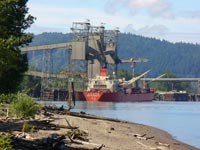
Oregon

Two bills relating to ballast water were passed by the 2007 legistlature, both of which implement some of the recommendations of the Oregon Ballast Water Task Force:
SB 643 makes minor changes to the definition of a cargo vessel that brings it into line with the USCG and recreates and expands the purview of the Task Force to include shipping related pathways other than ballast water.
SB 644 creates a position with Oregon DEQ to run the program.
You can download the bills here:
www.leg.state.or.us/07reg/measpdf/sb0600.dir/sb0643.intro.pdf
www.leg.state.or.us/07reg/measpdf/sb0600.dir/sb0644.intro.pdf
Existing Legislation
Existing Hull Fouling Legislation
On May 25, 2007, Senate Bill 432 came into law. Under this legislation, shipbreaking can happen only in dry dock areas with special exceptions when the Department of State Lands determines that it is impossible to move the shipwreck into dry dock. Get the full text of SB 432.
Existing Ballast Water Legislation
Senate Bill 895
The Oregon Legislature passed SB 895 in 2001 (which has been subsequently modified by the legislature in 2003 (HB 3620), 2005 (HB 2170), and 2007 (SB 643)) to prohibit the discharge of ballast water into state waters except under specified conditions (see below), require ballast water management reports at least 24 hours prior to entry into the state, and establish a task force to study and recommend action to the Oregon Legislature. Oregon recognizes the international nature of the aquatic nuisance species problem, and declared the state's support for international and federal programs, and declared the state's intent that its rules be coordinated with related rules and regulations adopted by Washington and California.
Conditions for Ballast Water Discharge
A vessel may discharge ballast water in the waters of the state if:
- The vessel has conducted an open ocean exchange (at least 200 nautical miles (nm) from shore and in waters at least 2000 meters deep); or
- A coastal exchange of ballast water has been performed (at least 50 nm from shore and in waters at least 200 meters deep) for vessels on coastal voyages traveling to Oregon from a North American coastal port south of 40° N or north of 50°N; or
- The vessel discharges ballast water that has been treated to remove organisms in a Coast Guard-approved manner; or
- Conditions are such that without performing an exchange, the exchange would be unsafe or infeasible due to adverse weather, vessel design limitations or equipment failure.
Ballast Water Management Reports
Reports from covered vessels are required and may be submitted through the Merchants Exchange of Portland on forms acceptable to the United States Coast Guard. Information must be reported to the Department of Environmental Quality at least 24 hours before entering state water or, if the voyage is less than 24 hours, prior to departing the port or place of departure.
The Department of Environmental Quality may impose a civil penalty on the owner or operator of a vessel for failure to comply with ballast water management requirements. The penalty imposed may not exceed $5,000 per violation. The civil penalty for a violation of the reporting requirements shall not exceed $500 per violation.
For More Information
All inquiries should be directed to me, Rian Hooff at 503-229-6865 or hooff.rian@deq.state.or.us. More information can also be obtained from the OR DEQ ballast program webpage or by downloading a copy of the ballast program fact sheet.